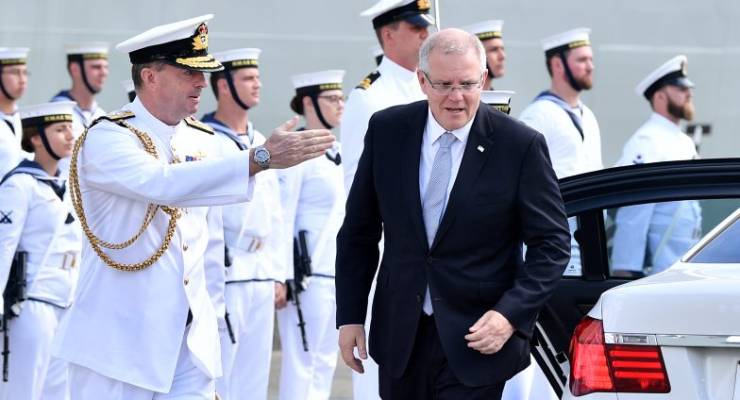
Scott Morrison’s prime ministership began with great speed and vigour. Problems were anticipated and dealt with, rather than left to fester. Barnacles were removed, or at least chipped away at. Key slogans were articulated and a carefully confected image presented. Then, in the week before the Wentworth byelection, it fell off a cliff. Specifically, the kind of cliff in a Warner Bros’ cartoon that a character runs over and briefly sprints in mid-air before gravity, and a painful awareness of their fate, takes hold.
The sordid saga of the Jerusalem embassy move dominated the week before and after the byelection. Before, it was a profoundly cynical, ill-informed and highly risky stunt to attract, or save, a tiny number of votes. After, the astonishing lack of process behind it, which included Foreign Minister Marise Payne blindsiding her own department and keeping it in the dark, dominated last week. This was amateur hour stuff by a bunch of people not up to the job.
That impression was strongly reinforced by the remarkable sight yesterday of Malcolm Turnbull meeting with Indonesian President Joko Widodo, and opining about the Jerusalem move — in effect saying it was a dumb idea and the government already knew that — while assuring us the Indonesia-Australia “preferential trade agreement” would go ahead soon.
Turnbull, who has been at pains to note that he has left partisan politics and is now purely Citizen Turnbull, seems to have taken on an unprecedented role. He’s not a diplomat. He’s not an expert — he’s notionally attending an oceans conference in Bali. He’s not a minister, who would be bound by cabinet solidarity to support the Jerusalem move review, rather than bluntly state he’d been told it was a bad idea. But he’s there representing Australia, not so much on matters oceanographic and piscatorial as to repair the relations with Indonesia damaged by the announcement.
Turnbull’s playing the role of a PM-at-large, a role with no rules and with complete freedom, and doing so at the behest of the man who replaced him — the man whose flailing polling performance he happily “likes” on social media.
Tony Abbott has never felt any restrictions on his freedom, either, since he too was sacked by his own party from the leadership. He, too, has been given a role by Morrison, a strange one of “Indigenous envoy” that recognises, perhaps, that few people in parliament have shown Abbott’s engagement with Indigenous issues over a long period, but fails to recognise Indigenous Australians don’t need or want another white person acting as an “envoy”.
But like Turnbull, Abbott doesn’t confine himself to that area. Yesterday he was articulating why children and indeed other asylum seekers (Abbott insists, entirely wrongly, that most are “economic migrants”) should be left on Nauru. Indeed, he explained, Nauru was a lovely place, if you liked the tropics, and had better health services than regional communities — a peculiar argument from a government that has been there for sixteen of the last 22 years and which is partly composed of a party representing regional communities. Anyway, it served the purpose.
In contrast, what’s Morrison’s position on kids off Nauru? Well, depends when you ask. Before Wentworth, it was all touchy-feely let’s-see-if-we-can-compromise on sending them to New Zealand. After, it was “we don’t need no stinkin’ compromise” and a rebuff to Labor, even as his own backbenchers began turning on the government’s policy.
Abbott even laid out a policy agenda for a “centre-right” Morrison government in the Liberal pamphlet The Australian, complaining Morrison hadn’t yet “abandoned Turnbull’s commitment to emissions reduction nor changed the immigration policy. He’s kept Snowy 2.0 and Gonski 2.0. He hasn’t solved the challenge to religious freedom in the era of identity politics and ultra-left activism — and he probably can’t.”
With Abbott seeking to run domestic policy and Turnbull apparently delegated to mop up the government’s foreign policy stuff-ups, is Scott Morrison actually prime minister in a meaningful way, or merely the most prominent in a triumvirate? And what happens when another former leader, Barnaby Joyce, seizes back the deputy prime ministership and returns to cabinet? Scott Morrison, first among equals?








Dutton will be eyeing the telephone in his office and wondering at what point he should start making phone calls to “the gang”.
May the Devil make it happen – please, Peter Dutton, summon the gang. Yet another opportunity for a Liberal Prime Minister to lose his seat.
Murdoch runs this country!
Can we trade in the three dysfunctional ones and get one good one?
A drover’s dog would be an improvement….
I thought the “silver bodgie” knifed it ?
Yes, it’s called a Labor victory at the upcoming election.
Brilliant, Bernard.
The Corporate Rent-seekers run this country, & that has never been more evident than right now. I notice that one of the donors to the Librorts Party has managed to benefit from out-sourcing of Centrelink jobs in Brisbane.